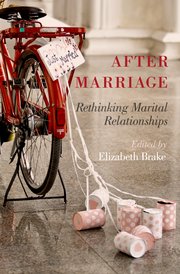Against Marriage
-
Blackwells Festival of Philosophy

 I’ll be launching and speaking about Against Marriage at Blackwell’s bookshop, Oxford on 16th November 2017, as part of the Oxford University Press Festival of Philosophy. Register for the event here.
I’ll be launching and speaking about Against Marriage at Blackwell’s bookshop, Oxford on 16th November 2017, as part of the Oxford University Press Festival of Philosophy. Register for the event here. -
Alumni Festival
I am speaking on “Should the State Recognise Marriage?” at the University of Cambridge Alumni Festival on 22nd September 2017. Details are here.
-
“Time to abandon marriage?” in the TLS
 The Times Literary Supplement (TLS) published my piece “Time to abandon marriage?” as part of their Ethical Angles Series (2017). Read it here.
The Times Literary Supplement (TLS) published my piece “Time to abandon marriage?” as part of their Ethical Angles Series (2017). Read it here. -
Regulating Religious Marriage at CEU
-
Philosophy 24/7
 You can listen to an interview with me on “The State and Marriage” at Philosophy 24/7 here.
You can listen to an interview with me on “The State and Marriage” at Philosophy 24/7 here. -
Philosophers on same-sex marriage at Daily Nous
 I am one of a panel of philosophers discussing the Supreme Court’s ruling on same-sex marriage at the Daily Nous blog. You can read it here.
I am one of a panel of philosophers discussing the Supreme Court’s ruling on same-sex marriage at the Daily Nous blog. You can read it here.On Friday, June 26th, the Supreme Court of the United States announced its ruling in Obergefell v. Hodges, holding that the Fourteenth Amendment of the United States Constitution guarantees the recognition and provision of same-sex marriage. It requires each of the 50 states in the US to issue marriage licenses to same-sex couples seeking them, and to recognize legitimate same-sex marriages performed in other jurisdictions. … The decision is a landmark in the development of the rights and liberties of gay and lesbian people in the US, and is not without its controversy, of course. Many questions have arisen about the reasoning of the majority and that of the dissenting justices, as well as the significance of the decision. To get clearer on some of these issues, [Daily Nous] asked several philosophers to contribute some brief remarks on the ruling. They are: Elizabeth Brake (Arizona State), Cheshire Calhoun (Arizona State), Clare Chambers (Cambridge), John Corvino (Wayne State), Brook Sadler (South Florida), Edward Stein(Cardozo), and Kevin Vallier (Bowling Green).
-
Global Justice: Agency, Power and Policy
 I was delighted to be the keynote speaker at this conference in May 2016, organised by the Centre for Global Ethics at the University of Birmingham. More details of the conference here.
I was delighted to be the keynote speaker at this conference in May 2016, organised by the Centre for Global Ethics at the University of Birmingham. More details of the conference here. -
Alan Milne Memorial Address
 I gave the Alan Milne Memorial Address at Durham University in October 2016. You can find details of that series here.
I gave the Alan Milne Memorial Address at Durham University in October 2016. You can find details of that series here. -
Beyond the nuclear family
 I had a fascinating time presenting at a conference on “Beyond the Nuclear Family” at Umea University in September 2015. More details here.
I had a fascinating time presenting at a conference on “Beyond the Nuclear Family” at Umea University in September 2015. More details here. -
The Limitations of Contract: Regulating Personal Relationships in the Marriage-Free State
 Many theorists defend relationship contracts. Some argue that enforceable relationship contracts should be available alongside existing or reformed state-recognised marriage, and available to either married or unmarried couples. Other theorists argue that relationship contracts are the best sort of legal regulation to replace marriage. It is this latter question that is the subject of this chapter. The chapter contrasts contract and directive models of regulation, and notes that contract appears more compatible with liberty than does directive. However this appearance is illusory since contracts can undermine liberty, directives can enhance liberty, and even a contract regime requires default directives. Moreover, there are various problems with the enforcement of relationship contracts. Specific performance is rarely appropriate in the relationship context. The alternative, fault-based compensatory alimony, risks causing injustice to vulnerable parties such as those who take on caring responsibilities (usually women) and children. Relational contract theory attempts to deal with some of these problems but has its own limitations. The chapter concludes that contract is not the best replacement for marriage.
Many theorists defend relationship contracts. Some argue that enforceable relationship contracts should be available alongside existing or reformed state-recognised marriage, and available to either married or unmarried couples. Other theorists argue that relationship contracts are the best sort of legal regulation to replace marriage. It is this latter question that is the subject of this chapter. The chapter contrasts contract and directive models of regulation, and notes that contract appears more compatible with liberty than does directive. However this appearance is illusory since contracts can undermine liberty, directives can enhance liberty, and even a contract regime requires default directives. Moreover, there are various problems with the enforcement of relationship contracts. Specific performance is rarely appropriate in the relationship context. The alternative, fault-based compensatory alimony, risks causing injustice to vulnerable parties such as those who take on caring responsibilities (usually women) and children. Relational contract theory attempts to deal with some of these problems but has its own limitations. The chapter concludes that contract is not the best replacement for marriage.Reviewers’ comments:
The book is “strenuously avant-garde”. The New York Times (5th April 2016).
Chambers’ chapter is “sobering and refreshing”. Notre Dame Philosophical Reviews (2nd May 2016).
Chambers, “one of the best-known advocates” of the claim that marriage should not be recognised by the state, contributes a “nuanced and lucid” chapter that is “among the most interesting contributions in the volume.” Hypatia (2017)
You can read more about the book here.
-
Aristotelian Society
 I presented my paper “The Marriage-Free State” to the Aristotelian Society on 7 January 2013. You can listen to the podcast of the presentation here.
I presented my paper “The Marriage-Free State” to the Aristotelian Society on 7 January 2013. You can listen to the podcast of the presentation here.

